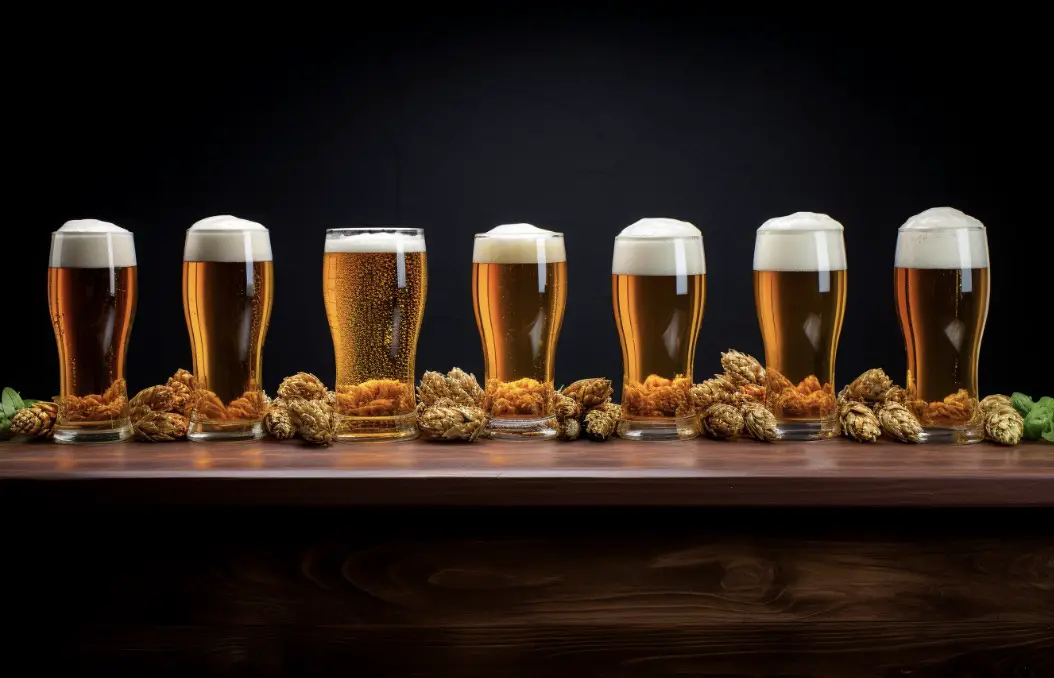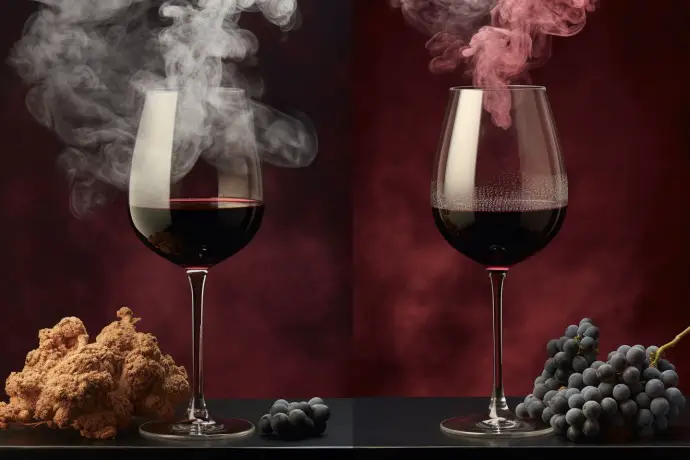If you’re a beer enthusiast, you may know a lot of hoppy beers that are known for their strong and bitter flavor.
But there are also beers with low hop content out there! These are especially appealing if you don’t like the bitterness of hops in your beer.
These beers offer a milder and less bitter taste, making them a great choice for those who prefer a smoother drinking experience.
What are low hops beers?
Low hops beers are brewed with a reduced amount of hops compared to traditional beers. Hops are flowers that add bitterness, flavor, and aroma to beer.
While hops are commonly used in brewing to balance the sweetness of malt, low hops beers rely more on the other ingredients, such as malt and yeast, to create a well-rounded flavor profile.
This results in a beer that is less bitter and has a more subtle hop presence.
Certainly! Here’s a combined list with WP formatting, including bolded keywords:
Top 10 Low Hops Beers on the Market
For beer enthusiasts who prefer a milder hop profile, discovering beers with a lower hop content can be a delightful experience.
If you’re in the hunt for beers with less hop prominence, here’s our 10 favorite low hops beers:
- Kona Brewing Company’s Big Wave Golden Ale: A smooth and refreshing ale that boasts tropical notes and light bitterness, proving to be a top pick for a serene beer experience.
- New Belgium Fat Tire Amber Ale: A beer known for its malty sweetness and caramel undertones. Its mild hop character appeals broadly, expertly striking the balance between hoppiness and silkiness.
- Lagunitas Brewing Company’s Little Sumpin Ale: A wheat ale with a modest hop essence that’s beautifully complemented by a smooth, citrusy taste. It’s a favorite among those seeking a refreshing and undemanding beer.
- Deschutes Brewery’s Mirror Pond Pale Ale: This pale ale offers a harmonious taste with a moderate hop touch. The hop flavor is artfully counterbalanced by a malty spine, creating a smooth and approachable beer.
- Stone Brewing Co.’s Arrogant Bastard Ale: Contrary to its audacious name, this ale provides a gentle hop experience. It presents just the right hint of bitterness for those seeking a milder hop profile.
- Berliner Kindl Weisse: A traditional German sour wheat beer. It’s light, tangy, and carries a pronounced lemony character, perfect for those wanting to evade hop bitterness.
- Jester King Brewery’s Le Petit Prince: A gentle farmhouse table beer with a subdued alcohol content and hoppiness. It’s an ideal choice for those looking for a light and smooth beer experience.
- The Alchemist’s Petit Mutant: A sour ale brewed with an abundant amount of cherries. The tartness, both from the cherries and the fermentation process, gives it a distinctive taste, sidelining any hop bitterness.
- Gruit Ancient Ale: Harkening back to ancient recipes, these modern gruit beers, like the ones from Gruit Brewing, are a throwback to times before hops dominated. With a unique herbal flavor, they offer minimal hop bitterness.
- Bell’s Oberon Ale: A classic American wheat beer, Oberon Ale is slightly hoppy and is accentuated by a mix of citrusy, spicy, and fruity notes. Its well-balanced profile ensures hops never overshadow the palate.
For those who gravitate towards less hop-forward beers, the aforementioned options present a spectrum of flavors and characteristics, ensuring there’s something for every palate.
Understanding IBU levels
When it comes to beer, some people prefer a hoppy flavor, while others enjoy a more balanced or even less bitter taste.
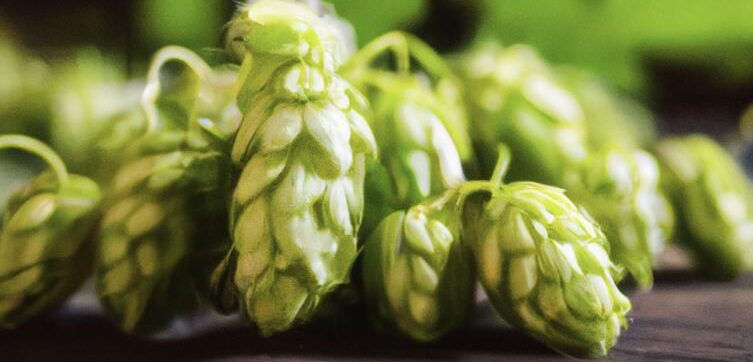
The bitterness in beer comes from hops, a key ingredient that imparts flavor and aroma to the brew.
This is more or less directly correlated to hop content is measured using the International Bitterness Units (IBU) scale.
IBU of Different Beer Styles
| Beer Type | IBU Range |
|---|---|
| American Light Lager | 8-12 IBU |
| Pilsner | 25-45 IBU |
| Wheat Beer | 10-20 IBU |
| American Pale Ale (APA) | 30-50 IBU |
| India Pale Ale (IPA) | |
| – English IPA | 40-60 IBU |
| – American IPA | 40-70 IBU |
| – Double or Imperial IPA | 60-120 IBU |
| Stout | |
| – Dry Stout | 30-45 IBU |
| – Sweet Stout | 20-40 IBU |
| – Oatmeal Stout | 25-40 IBU |
| – Imperial Stout | 50-80 IBU |
| Porter | |
| – Brown Porter | 18-35 IBU |
| – Robust Porter | 25-50 IBU |
| – Baltic Porter | 20-40 IBU |
| Barleywine | 50-100 IBU |
| Bock | 20-30 IBU |
| Märzen/Oktoberfest | 18-25 IBU |
| Belgian Dubbel | 15-25 IBU |
| Belgian Tripel | 20-40 IBU |
| Saison | 20-40 IBU |
| Lambic | 10-23 IBU |
| American Amber/Red Ale | 20-40 IBU |
Traditionally, beer did not contain hops at all!
Before the widespread use of hops in brewing, beer was made without them. Instead, brewers relied on a variety of herbs, flowers, and spices to add flavor and preserve the beer.
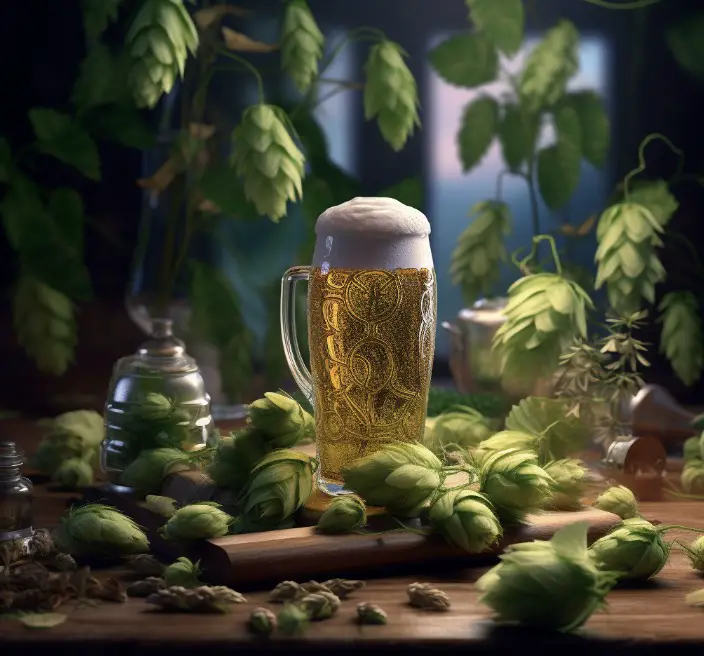
Hops were introduced later and became a staple ingredient due to their natural preservative properties.
However, some beer styles, such as certain Belgian ales and historical beer recreations, still follow the traditional practice of brewing without hops.
So, if you’re looking for a beer that offers a different taste experience or prefer a brew with lower hop content, low hops beers are worth exploring. They provide a refreshing option for those who enjoy milder flavors and a smoother drinking experience. [1]
Berliner Weisse – Traditional Low Bitterness Beer
Tasting notes and characteristics of Berliner Weisse
If you’re looking for a beer with the lowest hop content, Berliner Weisse is a great choice. Berliner Weisse is a tart and refreshing beer style that originated in Berlin, Germany. It is known for its low alcohol content, effervescence, and low bitterness.
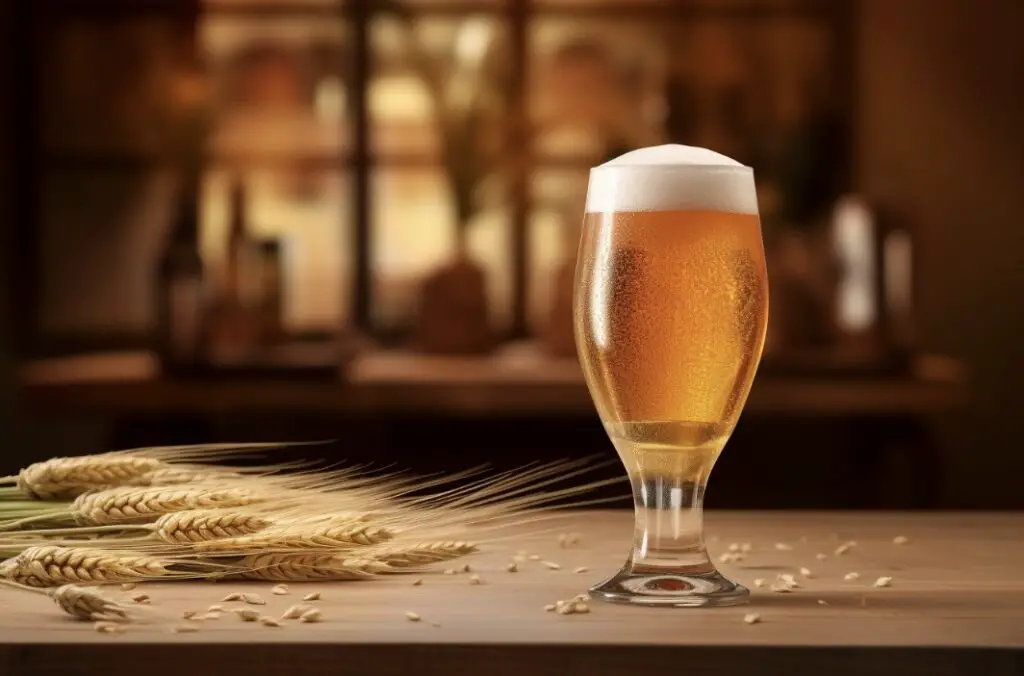
Berliner Weisse typically has an IBU level between 3 and 10, making it one of the least hoppy beers available.
This beer is often brewed with a combination of wheat and barley malt, which contributes to its unique flavor profile. It is commonly enjoyed with the addition of flavored syrups, such as raspberry or woodruff, to enhance its taste.
With its light and crisp character, Berliner Weisse is a popular choice for those who prefer a milder beer without the strong bitterness of hops. So, if you’re looking for a beer that is light, refreshing, and low in hop content, give Berliner Weisse a try.
American Light Lagers: A Common Low Hops Option
When it comes to beer, not everyone enjoys a strong hop flavor. For those who prefer a milder taste, American light lagers offer a great option. These beers are known for their smooth, refreshing qualities and lower hop content.
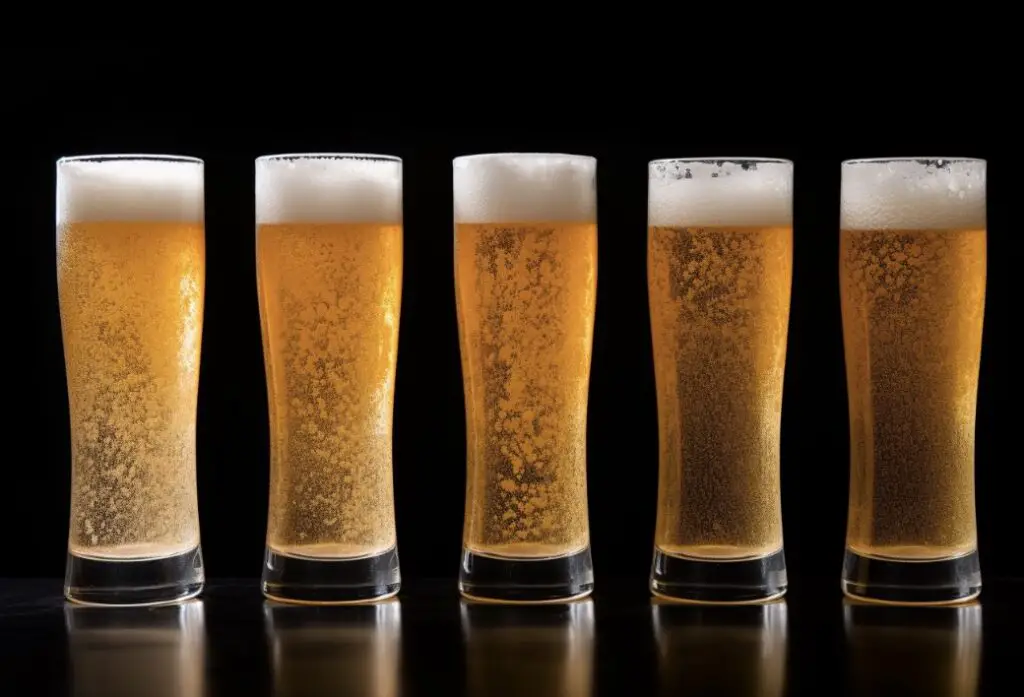
Exploring the IBU range of typical American light lagers
The International Bitterness Unit (IBU) scale measures the bitterness of beer, with higher numbers indicating more hop bitterness. American light lagers typically fall within the lower end of the IBU scale, ranging from around 8 to 20 IBUs. This makes them a popular choice for those seeking a beer with a subtle hop presence.
Popular brands and their low hops offerings
Several popular beer brands offer light lagers with low hops content. Bud Light, Coors Light, and Miller Lite are well-known examples that cater to those who prefer a lighter, less bitter taste.
These beers have become go-to choices for social gatherings, sporting events, and casual drinking occasions, thanks to their smooth and easy-drinking nature.
While light lagers may not appeal to hop lovers, they provide a refreshing option for those who prefer a more balanced and less bitter beer. So, if you’re looking for a brew with a mild hop content, try exploring the range of American light lagers available in the market.
Sour Beers: Tartness Over Bitterness
If a punch of hop bitterness isn’t your thing, then sour beers might be right up your alley. Distinct from other beer styles due to their intentionally tart or sour taste, these brews typically have a restrained hop profile, allowing the sour character to shine through.
Navigating the IBU scale of traditional sour beers
Sour beers often have a low International Bitterness Unit (IBU) value, as the focus is on showcasing the unique fermentation byproducts, like lactic acid, rather than hop bitterness. Their IBU generally ranges between 5 and 15, but this can vary depending on the specific style and brewing process.
The art and craft behind sour beers
Sour beers achieve their distinct tartness from a combination of wild yeast strains, bacteria, and sometimes even a mixed fermentation process involving both.
These components contribute not only to the sour flavor but also to a complex array of tasting notes, which can include fruity, earthy, and funky tones.
While hops play a role in sour beer production, their influence on flavor and bitterness is typically subdued to allow the unique fermentation characteristics to dominate.
Popular renditions of sour beers
There are numerous variations of sour beers, such as the Belgian Lambic, Gose, and Flanders Red Ale, each with its own unique taste and brewing tradition. Though they differ in many aspects, most share a common trait of low hop bitterness.
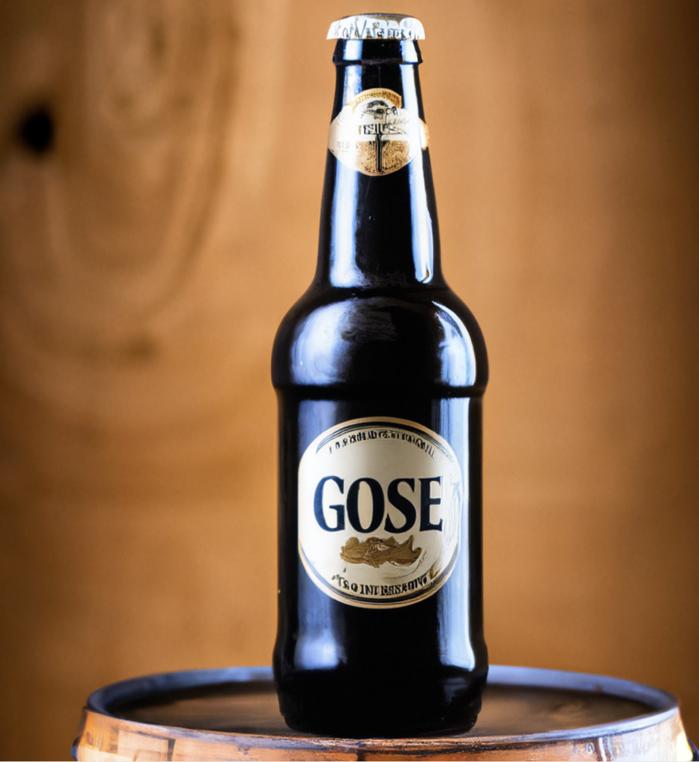
For those yearning for a beer experience that deviates from the usual hop-forward profiles and dives into a world of tangy, funky, and complex flavors, sour beers offer a delightful alternative.
If you’re keen on exploring a beer style that emphasizes tartness over hop bitterness, the sour beer realm awaits your palate.
Considerations When Choosing Low Hops Beers
When it comes to beer, the level of hop content can greatly affect the taste and experience. For those looking for beers with lower hop content, there are a few important factors to consider beyond just the hops.
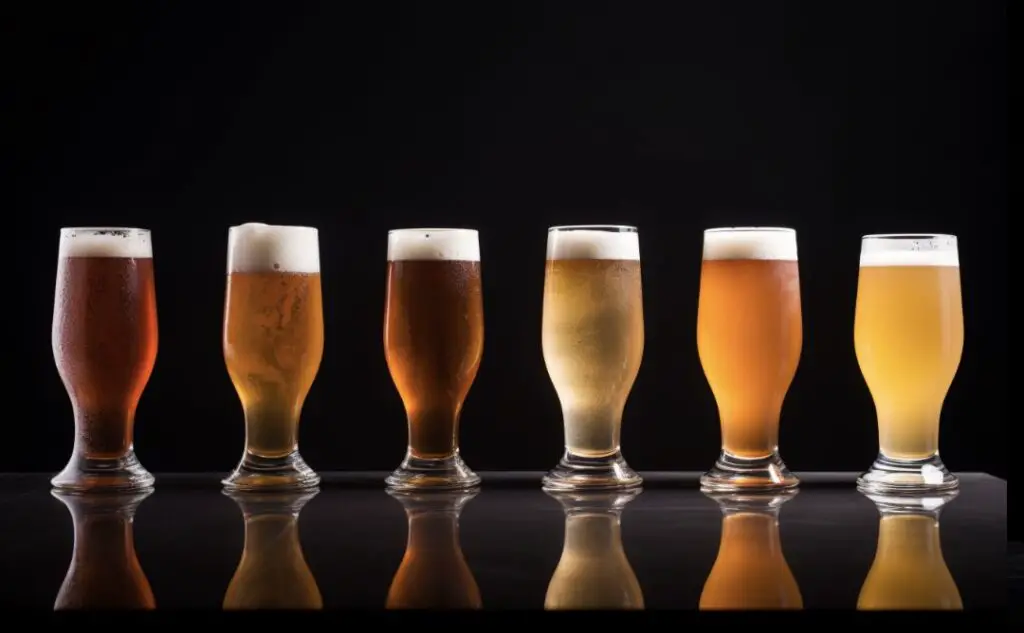
Factors to consider beyond hop content
- Malt Profile: Low hops beers often have a stronger malt profile, providing a sweet and malty flavor that balances out any bitterness.
- Yeast Strain: Different yeast strains can contribute unique flavors and aromas to the beer, so it’s worth exploring the yeast used in low hops beers to find ones that suit your preferences.
- Beer Style: Low hops content can vary depending on the style of beer, so it’s important to consider what kind of beer you enjoy. For example, lagers generally have lower hop content compared to IPAs.
Pairings and occasions for enjoying low hops beers
- Food Pairings: Low hops beers can complement a variety of dishes, including lighter fare such as salads, seafood, and poultry. The mild flavor allows the food to shine while providing a refreshing beverage.
- Social Occasions: Low hops beers are often favored in social situations where people may prefer a milder and easy-drinking option. They can be enjoyed during casual gatherings, picnics, or outdoor events.
- Introductory Beers: For those new to craft beer or who don’t enjoy strong hop bitterness, low hops beers can serve as a great introduction to the world of craft brewing.
While hop content is an important consideration, exploring factors beyond the hops can help you find low hops beers that align with your taste preferences and occasions. Cheers to finding the perfect brew!
Gruit – Adding Bitterness to Beer Without Hops
When it comes to beer, hops are typically the go-to ingredient for adding bitterness to balance out the malt sweetness. However, there is an alternative to hops known as gruit.

Gruit is an ancient herbal mixture that was traditionally used in brewing beer before the widespread use of hops. Instead of relying on hops for bitterness, gruit incorporates a blend of herbs and spices such as yarrow, bog myrtle, heather, and juniper.
The use of gruit in beer not only provides a different flavor profile but also offers an interesting historical perspective on brewing. Gruit can contribute a range of flavors and aromas, including earthy, floral, and herbal notes.
For those who prefer a beer with lower hop content or are looking for a unique taste experience, seeking out gruit beers can be a worthwhile endeavor. While they may not be as widely available as traditional hop-forward beers, there are craft brewers and specialty breweries that specialize in producing gruit beers.
Whether you are a beer enthusiast exploring new flavors or simply curious about alternative brewing methods, gruit offers a fascinating and flavorful journey into the world of beer.
Conclusion
For those who prefer beers with lower hop content, there are a variety of options available that provide a more balanced and milder taste. Some popular choices include wheat beers, fruit beers, amber ales, and cream ales. These styles tend to have a lower hop bitterness, making them more suitable for individuals who don’t enjoy the strong hoppy flavor.
Other good beverage options for people who don’t like hops
If you’re not a fan of hoppy beers, don’t worry! There are many other beverages that you can explore. Ciders, sour beers, stouts, and porters are excellent alternatives that offer different flavors and profiles. Ciders, in particular, come in a wide range of fruity and refreshing options that are perfect for those who prefer a lighter and sweeter taste.
Encouragement to explore and enjoy the diverse range of options
Don’t be afraid to step outside your comfort zone and try new things. Craft breweries and beer bars often offer a diverse selection of beers with varying hop levels. This allows you to experiment and find the perfect beer that suits your taste preferences. Remember, everyone’s palate is different, and there’s a beer out there for everyone.
So, whether you prefer a hop-forward IPA or a beer with little to no hop content, the world of craft beer has something for everyone. Cheers to exploring and enjoying the diverse range of options available!

